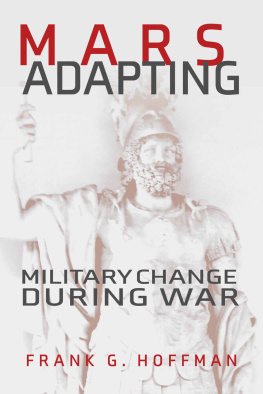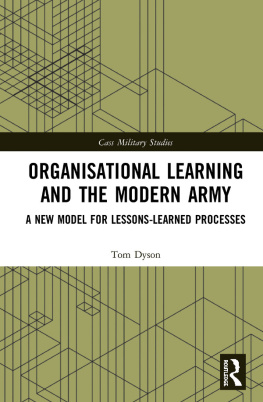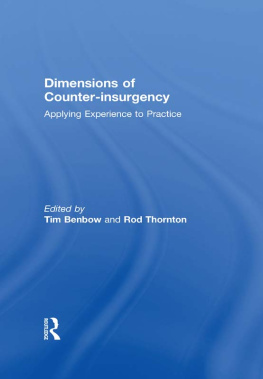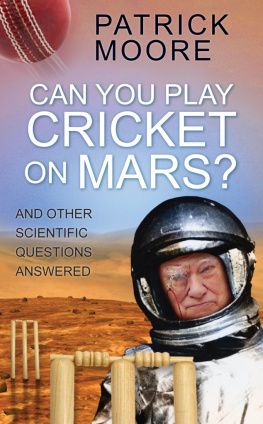MARS ADAPTING
Titles in the Series
The Other Space Race: Eisenhower and the Quest for Aerospace Security
An Untaken Road: Strategy, Technology, and the Mobile Intercontinental Ballistic Missile
Strategy: Context and Adaptation from Archidamus to Airpower
Cassandra in Oz: Counterinsurgency and Future War
Cyberspace in Peace and War
Limiting Risk in Americas Wars: Airpower, Asymmetrics, and a New Strategic Paradigm
Always at War: Organizational Culture in Strategic Air Command, 194662
How the Few Became the Proud: Crafting the Marine Corps Mystique, 18741918
Assured Destruction: Building the Ballistic Missile Culture of the U.S. Air Force
Transforming War
Paul J. Springer, editor
T o ensure success, the conduct of war requires rapid and effective adaptation to changing circumstances. While every conflict involves a degree of flexibility and innovation, there are certain changes that have occurred throughout history that stand out because they fundamentally altered the conduct of warfare. The most prominent of these changes have been labeled Revolutions in Military Affairs (RMAs). These so-called revolutions include technological innovations as well as entirely new approaches to strategy. Revolutionary ideas in military theory, doctrine, and operations have also permanently changed the methods, means, and objectives of warfare.
This series examines fundamental transformations that have occurred in warfare. It places particular emphasis upon RMAs to examine how the development of a new idea or device can alter not only the conduct of wars but their effect upon participants, supporters, and uninvolved parties. The unifying concept of the series is not geographical or temporal; rather, it is the notion of change in conflict and its subsequent impact. This has allowed the incorporation of a wide variety of scholars, approaches, disciplines, and conclusions to be brought under the umbrella of the series. The works include biographies, examinations of transformative events, and analyses of key technological innovations that provide a greater understanding of how and why modern conflict is carried out, and how it may change the battlefields of the future.
MARS ADAPTING
MILITARY CHANGE DURING WAR
FRANK G. HOFFMAN
NAVAL INSTITUTE PRESS
ANNAPOLIS, MARYLAND
Naval Institute Press
291 Wood Road
Annapolis, MD 21402
2021 by Frank G. Hoffman
All rights reserved. No part of this book may be reproduced or utilized in any form or by any means, electronic or mechanical, including photocopying and recording, or by any information storage and retrieval system, without permission in writing from the publisher.
Library of Congress Cataloging-in-Publication Data
Names: Hoffman, Frank G., author.
Title: Mars adapting : military change during war / Frank G. Hoffman.
Other titles: Military change during war
Description: Annapolis, MD : Naval Institute Press, [2021] | Series: Transforming war | Includes bibliographical references and index. | Identifiers: LCCN 2020050495 (print) | LCCN 2020050496 (ebook) | ISBN 9781682475898 (hardback) | ISBN 9781682475904 (ebook) | ISBN 9781682475904 (pdf)
Subjects: LCSH: Military art and scienceCase studies. | Military doctrineUnited StatesCase studies. | Operational art (Military science)Case studies. | TacticsCase studies. | Adaptability (Psychology) | Organizational learningUnited StatesCase studies. | Organizational changeUnited StatesCase studies.
Classification: LCC U104 .H57 2021 (print) | LCC U104 (ebook) | DDC 355.02dc23
LC record available at https://lccn.loc.gov/2020050495
LC ebook record available at https://lccn.loc.gov/2020050496
 Print editions meet the requirements of ANSI/NISO z39.48-1992 (Permanence of Paper).
Print editions meet the requirements of ANSI/NISO z39.48-1992 (Permanence of Paper).
Printed in the United States of America.
29 28 27 26 25 24 23 22 219 8 7 6 5 4 3 2 1
First printing
Contents
Illustrations
Figure
Maps
Tables
Acknowledgments
M ajor projects, like writing a book, accumulate many debts. Words cannot begin to recognize properly the many individuals and institutions that have supported my work. Nor is my prose adequate to the task of expressing my appreciation to so many people. But a public acknowledgment is a start.
Foremost among my intellectual creditors is Prof. Theo Farrell, former head of the War Studies Department at Kings College, London. A long-standing scholar of military change and an extraordinarily supportive teacher, Dr. Farrell has consistently steered me with probing Socratic questions and the discipline of Occams razor. Theo brings to mind the famous line attributed to Pericles that what you leave behind is not engraved in stone monuments, but is woven into the lives of others. His books are wonderful, but his greatest achievement is woven into the minds and output of many students.
Dr. David Betz, also from KCL, routinely provided further counsel. Dr. Sergio Catignani of Exeter University and the noted historian Dr. Robert Foley, at the Defence Academy of the United Kingdom in Shrivenham, offered numerous improvements. I am also grateful to Dr. John Stone of Kings College and Dr. Thomas Rid, now at Johns Hopkins Universitys School of Advanced International Studies in Washington, as well as the insights and assistance of KCL graduates James Russell and Raphael Marcus.
Likewise, many academics, including Mike Noonan, Adam Grissom, David Ucko, Terry Terriff, Josh Jones, John Kuehn, and Randy Papadopoulos, have been active guides. Prof. Williamson Murray, a lifelong mentor, has been extraordinarily instructive (and patient), and his friendship and editorial guidance have meant much to me. Navy commander Joel Holwitt chipped in at a critical time, with both comments and sources. Trent Hone, author of Learning War, an outstanding study of the Navys surface fleet in the interwar era, was an extremely incisive commentator on the entire draft. A great deal of encouragement was rendered by my colleague-in-arms, Col. George Pat Garrett, USMC (Ret.).
As anyone doing primary research realizes, archivists too often are under-appreciated. The professionals at the Library of Congress and the National Archives and Records Administration (NARA) were invaluable to my World War II work, especially Nathaniel Patch at the latter, who is extraordinarily knowledgeable. Likewise, Theresa Clements at the Naval War College archives went beyond the call of duty. Tim Francis at the Navy Heritage and Museum Command rendered assistance. The Armys Education and Heritage Center in Carlisle was very useful and flexible. Finally, Dr. Charles Neimeyer of the U.S. Marine Corps History and Museum Division in Quantico supported my research. The archivists there, particularly Dr. Fred Allison, were uniformly helpful. The National Defense University library at Fort McNair was an invaluable resource.
I am extremely fortunate to work at the Institute for National Strategic Studies (INSS), which has sustained a high standard of serious and collaborative scholarship for many years. Its scholars are great teammates. I am especially thankful to Dr. Richard D. Hooker Jr., the director of the INSS, for his material support when I was researching this book. My office mates, Phil Saunders, Chris Yung, and T. X. Hammes, offered valuable feedback. Finally, Ted Pikulsky helped in editing and Michael Davies was a candid sounding board.














 Print editions meet the requirements of ANSI/NISO z39.48-1992 (Permanence of Paper).
Print editions meet the requirements of ANSI/NISO z39.48-1992 (Permanence of Paper).